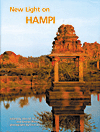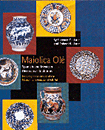

| |
| Editors' Picks | Volume 55 Number 2, March/April 2002 |
New Light on Hampi (Mumbai, India: Marg Publications, 2001; $66; distributed by Art Media Resources, Ltd., Chicago), edited by John M. Fritz and George Michell, surveys the results of 20 years' work by an international team at the fourteenth-sixteenth-century imperial city of Vijayanagara, near the village of Hampi in southern India. Essays cover everything from intricately carved plaster decoration on courtly buildings to hydraulic works. Vijayanagara is one of the world's most photogenic sites, and the editors have taken full advantage of that in this well-illustrated book. |

|

|
Forget everything Caesar told you about those "filthy natives" and pick up a copy of Peter Wells' The Barbarians Speak: How the Conquered Peoples Shaped Roman Europe, recently issued in paperback (Princeton: Princeton University Press, 2001; $17.95). Wells, who has dug extensively in Germany, uses archaeology to tell, in an accessible style, the story of the Roman conquest of Europe from the perspective of indigenous Celtic and German populations. |
Edward Fox tries to get to the bottom of the ten-year-old unsolved murder of Albert Glock, American director of the Archaeology Institute at Palestine's major university, Bir Zeit, in Sacred Geography: A Tale of Murder and Archaeology in the Holy Land (New York: Metropolitan/Holt, 2001; $26). Israelis allege Glock was murdered by a Palestinian--perhaps a situation involving "family honor"--while Palestinians argue an Israeli hit squad was responsible. What Fox concludes will satisfy neither side (see "West Bank Thriller," January/February 2002, p. 60). |

|

|
Renowned ceramics expert Florence C. Lister and her late husband, archaeologist Robert H. Lister, put their talents to good use in the elegant Maiolica Olé: Spanish and Mexican Decorative Traditions (Santa Fe: Museum of New Mexico Press, 2001; $50). The book presents 144 pieces from the Museum of New Mexico's ceramics collection, tracing the development of majolica in Spain and colonial Mexico from the seventeenth to the nineteenth century. This richly illustrated volume will be equally at home in the specialist's library and on the coffee table. |
JAN/FEB PICKS | ARCHAEOLOGY's bookstore
© 2002 by the Archaeological Institute of America archive.archaeology.org/0203/reviews/picks.html |
Advertisement

Advertisement






